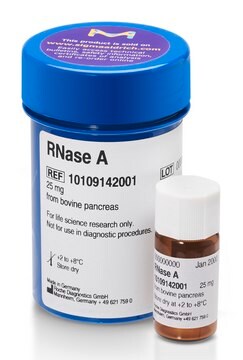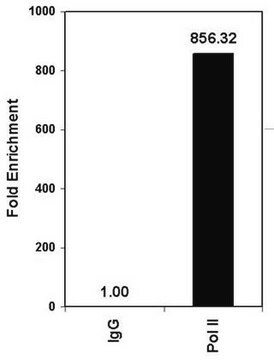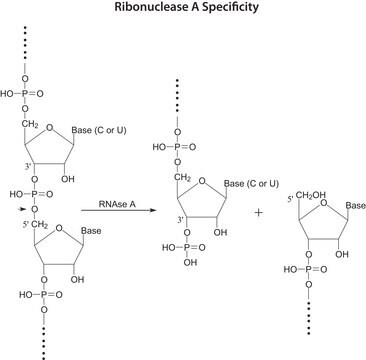17-630
ChIPAb+ Acetylo-Histone H4 - przeciwciało i zestaw primerów zweryfikowane pod kątem ChIP
serum, from rabbit
Zaloguj sięWyświetlanie cen organizacyjnych i kontraktowych
About This Item
Kod UNSPSC:
12352203
eCl@ss:
32160702
NACRES:
NA.52
Polecane produkty
pochodzenie biologiczne
rabbit
Poziom jakości
forma przeciwciała
serum
klon
polyclonal
reaktywność gatunkowa
eukaryotes, human
producent / nazwa handlowa
ChIPAb+
Upstate®
metody
ChIP: suitable
cell based assay: suitable
immunoprecipitation (IP): suitable
multiplexing: suitable
western blot: suitable
numer dostępu NCBI
numer dostępu UniProt
Warunki transportu
dry ice
Opis ogólny
All ChIPAb+ antibodies are individually validated for chromatin precipitation, every lot, every time. Each ChIPAb+ antibody set includes control primers (tested every lot by qPCR) to biologically validate your IP results in a locus-specific context. The qPCR protocol and primer sequences are provided, allowing researchers to validate ChIP protocols when using our antibody in their chromatin context. Each set also includes a negative control antibody to ensure specificity of the ChIP reaction.
The ChIPAb+ Acetyl-Histone H4 set includes purified rabbit polyclonal antiserum and the normal rabbit IgG antiserum, which can be used to demonstrate that the acetyl-histone H4 antibody is capable of precipitating acetyl-histone H4 associated chromatin. The qPCR primers included flank the human GAPDH promoter and produce a 166 base pair PCR product.
The ChIPAb+ Acetyl-Histone H4 set includes purified rabbit polyclonal antiserum and the normal rabbit IgG antiserum, which can be used to demonstrate that the acetyl-histone H4 antibody is capable of precipitating acetyl-histone H4 associated chromatin. The qPCR primers included flank the human GAPDH promoter and produce a 166 base pair PCR product.
Specyficzność
Predicted broad cross-reactivity among eukaryotes based upon sequence similarity.
Recognizes acetylated histone H4 of approximately 10 kDa. Cross-reacts with acetylated histone H2B from Tetrahymena and weakly crossreacts with acetylated histone H2B from HeLa cells.
May cross-react with other acetylated proteins.
May cross-react with other acetylated proteins.
Immunogen
The acetyl-histone H4 antiserum is made against a peptide corresponding to amino acids 2-19 of Tetrahymena histone H4.
Zastosowanie
Research Category
Epigenetics & Nuclear Function
Epigenetics & Nuclear Function
Research Sub Category
Histones
Histones
This ChIPAb+ Acetyl-Histone H4 -ChIP Validated Antibody & Primer Set conveniently includes the antibody & the specific control PCR primers.
Western Blot Analysis:
Acidextracted proteins from normal HeLa cells (Lane 1) and HeLa cells treated with 5 mM sodium butyrate for 24 hours (Lane 2) were resolved by electrophoresis, transferred to nitrocellulose and probed with anti-acetyl Histone H4 (1:2000).
Proteins were visualized using a goat-anti rabbit secondary antibody conjugated to HRP and a chemi-luminescence detection system. (Please see figures).
Acidextracted proteins from normal HeLa cells (Lane 1) and HeLa cells treated with 5 mM sodium butyrate for 24 hours (Lane 2) were resolved by electrophoresis, transferred to nitrocellulose and probed with anti-acetyl Histone H4 (1:2000).
Proteins were visualized using a goat-anti rabbit secondary antibody conjugated to HRP and a chemi-luminescence detection system. (Please see figures).
Opakowanie
25 assays per set. ~4 μL per chromatin immunoprecipitation
Jakość
Chromatin Immunoprecipitation:
Sonicated chromatin prepared from untreated HeLa cells (1 X 106 cell equivalents) was subjected to chromatin immunoprecipitation using 4 μL of either a normal rabbit antiserum or Anti-Acetyl Histone
H4 serum and the Magna ChIP A (Cat. # 17-610) Kit. Successful immunoprecipitation of acetyl histone H4 associated DNA fragments was verified by qPCR using control ChIP Primers flanking the human GAPDH promoter (Please see figures).
Please refer to the EZ-Magna A ChIP (Cat. # 17-408) or EZ-ChIP (Cat. # 17-371) protocol for experimental details.
Sonicated chromatin prepared from untreated HeLa cells (1 X 106 cell equivalents) was subjected to chromatin immunoprecipitation using 4 μL of either a normal rabbit antiserum or Anti-Acetyl Histone
H4 serum and the Magna ChIP A (Cat. # 17-610) Kit. Successful immunoprecipitation of acetyl histone H4 associated DNA fragments was verified by qPCR using control ChIP Primers flanking the human GAPDH promoter (Please see figures).
Please refer to the EZ-Magna A ChIP (Cat. # 17-408) or EZ-ChIP (Cat. # 17-371) protocol for experimental details.
Opis wartości docelowych
10 kDa
Postać fizyczna
Anti-Acetyl-Histone H4 (rabbit polyclonal IgG). One vial containing 100 μL of antiserum containing 0.05% sodium azide. Store at -20°C.
Normal Rabbit Serum. One vial containing 100 uL antiserum containing 0.05% sodium azide. Store at -20°C.
Control Primers. One vial containing 75 μL of 5 μM of each primer specific for for human GAPDH.
Normal Rabbit Serum. One vial containing 100 uL antiserum containing 0.05% sodium azide. Store at -20°C.
Control Primers. One vial containing 75 μL of 5 μM of each primer specific for for human GAPDH.
Przechowywanie i stabilność
Stable for 1 year at -20°C from date of receipt.
Komentarz do analizy
Control
Included negative control rabbit IgG antiserum and control primers specific for human GAPDH promoter.
Included negative control rabbit IgG antiserum and control primers specific for human GAPDH promoter.
Informacje prawne
UPSTATE is a registered trademark of Merck KGaA, Darmstadt, Germany
Oświadczenie o zrzeczeniu się odpowiedzialności
Unless otherwise stated in our catalog or other company documentation accompanying the product(s), our products are intended for research use only and are not to be used for any other purpose, which includes but is not limited to, unauthorized commercial uses, in vitro diagnostic uses, ex vivo or in vivo therapeutic uses or any type of consumption or application to humans or animals.
Ta strona może zawierać tekst przetłumaczony maszynowo.
Kod klasy składowania
10 - Combustible liquids
Certyfikaty analizy (CoA)
Poszukaj Certyfikaty analizy (CoA), wpisując numer partii/serii produktów. Numery serii i partii można znaleźć na etykiecie produktu po słowach „seria” lub „partia”.
Masz już ten produkt?
Dokumenty związane z niedawno zakupionymi produktami zostały zamieszczone w Bibliotece dokumentów.
Rosita Accardi et al.
Carcinogenesis, 36(11), 1440-1451 (2015-10-02)
Although Epstein-Barr virus (EBV) infection is widely distributed, certain EBV-driven malignancies are geographically restricted. EBV-associated Burkitt's lymphoma (eBL) is endemic in children living in sub-Saharan Africa. This population is heavily exposed to food contaminated with the mycotoxin aflatoxin B1 (AFB1).
Chunjian Huang et al.
Journal of immunology (Baltimore, Md. : 1950), 190(9), 4470-4473 (2013-04-02)
Regulatory T cells (Tregs) play a pivotal role in the maintenance of immunological self-tolerance. Deficiency or dysfunction of Tregs leads to severe autoimmune diseases. Although the forkhead/winged-helix family member FOXP3 is critical for Treg differentiation and function, the molecular basis
Rosita Accardi et al.
PLoS pathogens, 9(3), e1003186-e1003186 (2013-03-22)
Many studies have proved that oncogenic viruses develop redundant mechanisms to alter the functions of the tumor suppressor p53. Here we show that Epstein-Barr virus (EBV), via the oncoprotein LMP-1, induces the expression of ΔNp73α, a strong antagonist of p53.
Y Y Lee et al.
Cell death and differentiation, 20(7), 941-952 (2013-04-13)
Catecholamines regulate the β-adrenoceptor/cyclic AMP-regulated protein kinase A (cAMP/PKA) pathway. Deregulation of this pathway can cause apoptotic cell death and is implicated in a range of human diseases, such as neuronal loss during aging, cardiomyopathy and septic shock. The molecular
Dandan Niu et al.
Cancers, 2(3), 1689-1704 (2010-01-01)
Deleted in Lung and Esophageal Cancer 1 (DLEC1) is a functional tumor suppressor gene (TSG). It has been found to be silenced in a variety of human cancers including hepatocellular carcinoma (HCC). The silencing of DLEC1 can be modulated by
Nasz zespół naukowców ma doświadczenie we wszystkich obszarach badań, w tym w naukach przyrodniczych, materiałoznawstwie, syntezie chemicznej, chromatografii, analityce i wielu innych dziedzinach.
Skontaktuj się z zespołem ds. pomocy technicznej






